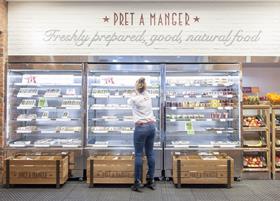
With food-to-go taking a bigger bite out of international grocery markets, IGD has identified the main trends set to shape the sector.
Gavin Rothwell, senior retail insight manager at the research organisation believes trends such as health, alternative shopping missions and an increased fusion between retail and food-to-go concepts will be central to the development of food-to-go.
Here, in Rothwell’s words, are the top five trends to look out for:
1. The rise and rise of health and wellness
“Shoppers are increasingly aware of health and wellness, and food-to-go operators are expanding the variety of flavours and products available to meet this demand.
“Foods that support active lifestyles and tick the box for dietary needs are performing well, while wearable technology and apps are helping shoppers to better understand the nutritional and calorific value of what they consume.
“UK food-to-go shoppers are especially interested in products that suit particular diets, with 34 per cent looking for a larger range of vegetarian products, 25 pr cent more dairy-free products and 23 per cent seeking more vegan or gluten-free options.”
2. Targeting new locations
“Many food-to-go specialists are now expanding to reach new types of shopper. For example, both Tossed and Pret are now present in motorway services, while Subway and Greggs are expanding across petrol forecourts to target the on-the-go shopper.
“Other operators, such as Leon and Tortilla, are also opening stores outside London for the first time, to meet growing appetite for food-to-go outside the capital.”
3. An increased focus on ‘alternative missions’
“By ‘alternative missions’, we mean food-to-go occasions beyond the classic options of coffee or lunch. Although many retailers and specialists are focusing their efforts on breakfast, this is a relatively small market and spend per trip can be quite modest.
“We’re therefore expecting to see a broader focus on alternative missions at different times of day – some of this might be for evening meals, but there may also be opportunities at other times of day, for example a post-work snack or post-gym energy boost.
“Snacking provides a great opportunity for food-to-go operators. Almost half (45 per cent) of UK adults have bought a snack on-the-go in the last month so the size of the prize is huge.”
4. Further integration of technology
“Almost all shoppers (92 per cent) think speed and efficiency of service is an important driver of deciding where to shop for food and drink, so we expect technology to play an even bigger role in food-to-go in the future.
“Outlets such as San Francisco's Eatsa and London's Inamo have completely transferred customers' entire ordering experience to in-store tablets, and last year Starbucks introduced a remote ordering app – a technology we also expect to really grow in popularity.
“US salad specialist Sweetgreen is going one step further, converting most of its stores to be cashless.”
5. More fusion between retail and food-to-go concepts
“Grocery retailers across the world are looking at how they can better cater for the food-to-go opportunity.
“For the likes of Whole Foods Market and Wegmans in the US, it's already a core part of their offer. However, other super and hypermarket retailers, such as Carrefour with its Bon App shop-in-shop format, are also focusing more on this area.
“For smaller retail formats, Irish retailers are setting a great example in this field. For example, Musgrave's Centra has been extremely progressive in how it delivers a compelling food-to-go offer, a convenience store and an enticing eat-in area in one single space.
“We expect more of this to follow in 2017 and beyond, as more retailers look to capture a share of the growing food-to-go opportunity.”
The statistics quoted are taken from 2016 ShopperVista surveys on shopper attitudes carried out by IGD.



